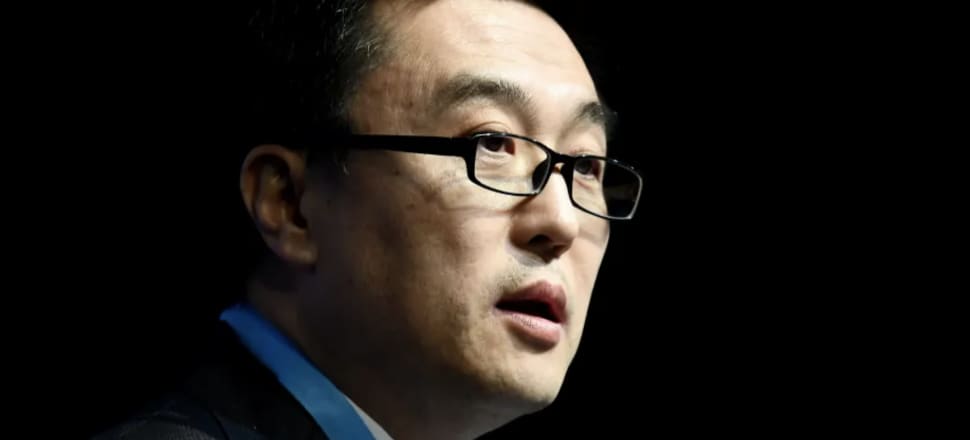
China's man in Wellington makes it clear Beijing doesn't want New Zealand partnering Nato in any push to contain China in the Indo-Pacific
Prime Minister Chris Hipkins returns to New Zealand on Friday from the high-powered Nato summit to a ringing warning from China over this country engaging further with Nato in developing a security bloc in this part of the world.
The Chinese Ambassador to Wellington, Wang Xiaolong, issued a statement even before Hipkins had boarded his return flights from the summit venue, Vilnius in Lithuania, in which he warned New Zealand not to "open the door to the devil" by cosying up to any Nato bloc in the Asia-Pacific region.
China accuses Nato, and by implication the United States, of attempting to establish an Indo-Pacific security bloc to contain China in the region.
Wang's sharp words come a fortnight after Hipkins visit to Beijing and meeting with President Xi Jinping, which was generally regarded as a success in maintaining New Zealand's status as a "friend and partner" of China.
The ambassador's statement says: "First and foremost, partnering with a warmongering military bloc is against both regional and global commitment to promoting peace and stability."
His denunciation of the North Atlantic Treaty Organisation alliance, which just hosted Hipkins and the Australian Prime Minister Anthony Albanese, among others, continues:
"The Ukraine crisis shall not be an excuse for Nato to expand its presence in the Asia-Pacific. No matter how hard Nato attempts to whitewash its blood-tainted reputation by claiming itself as a 'defensive' alliance, it is, in essence, still a military bloc obsessed with so-called “absolute security."
Wang claims establishing a "replica" of Nato in the Asia-Pacific region violates Nato's own charter, which focuses on the North Atlantic zone.
"What countries want in this region is to maintain strategic independence and keep the region stable and prosperous as opposed to the Nato way of fuelling armed conflicts and bloc confrontation.
"Nato has never contributed to peace and security of our region in history and will hardly do so in future. All those who truly love peace and are committed to safeguarding peace should resolutely reject Nato’s continued eastward expansion."
He directly challenges New Zealand not to be drawn into the Nato alliance's push in this region.
"It is hoped that New Zealand, as a longstanding staunch supporter of regional peace and cooperation, will stay vigilant of Nato’s outreach in the Asia-Pacific region, refrain from opening the door to the devil and oppose any rhetoric or action that leads to inciting bloc confrontation in Asia Pacific."
Wang's unusually strongly worded missive, sent to New Zealand media, prompted a robust response from Foreign Affairs Minister Nanaia Mahuta.
She told Newsroom: "We welcome Nato’s engagement with its partners from the Indo-Pacific based on exchanging insights and addressing common security challenges."
New Zealand had long connections to Nato.
"Other countries’ bilateral relationships with Nato is a matter for them. New Zealand and NATO however have a long history of cooperation and share a strong commitment to the international-rules based system and established rules and norms."
But Mahuta was having none of the ambassador's attempts to paint Nato involvement in this region as forming some kind of bloc targeted at China.
"Its important to note that Nato has been clear that it is a Euro-Atlantic alliance and neither New Zealand nor Nato considers that Nato’s partners from the Indo-Pacific represent a new bloc or formal regional grouping," she told Newsroom.
Wang's unvarnished warning to New Zealand to hold back from any Nato plans in the Indo-Pacific region came as the Prime Minister wrapped up a series of meetings with Nato's leadership.
In a speech to Nato members, including the other leaders of the so-called Asia-Pacific 4, Australia, Japan and South Korea, Hipkins said that in his visit two weeks ago to Beijing he "encouraged China to play a constructive role" to attempt to influence Russia over the invasion of Ukraine.
"China's increasing assertiveness is resulting in geopolitical change and competition," he said.
"Critical supply chain disruptions, economic coercion and foreign interference are shared security challenges for New Zealand, the Pacific and Nato allies alike."
Newsroom's foreign affairs editor, Sam Sachdeva, author of The China Tightrope on this country's relations with the Asian power, was in Vilnius ahead of the summit.
He reported that Nato was indeed looking further afield than its historic zone and immediate concerns in Ukraine and on its eastern borders with Russia.
From Sachdeva's report earlier this week: "Nato’s interest in the Asia-Pacific (or Indo-Pacific) has grown in recent years, with the alliance mentioning China for the first time last year in its “strategic concept”, a document updated roughly once a decade to outline the major security challenges it faces.
That broadening of view has sparked some controversy, with a proposal to establish a Nato liaison office in Tokyo put on the backburner after reported objections from the French president, Emmanuel Macron.
The proposal also attracted criticism from China, with a foreign ministry spokesperson accusing Nato of “attempts to destroy regional peace and stability”.
A Nato official interviewed for the story is is at pains to say the alliance “will never be an Indo-Pacific organisation” and always operates by consensus, both with its current members and with those farther afield (such as New Zealand) who wish to work with it.







